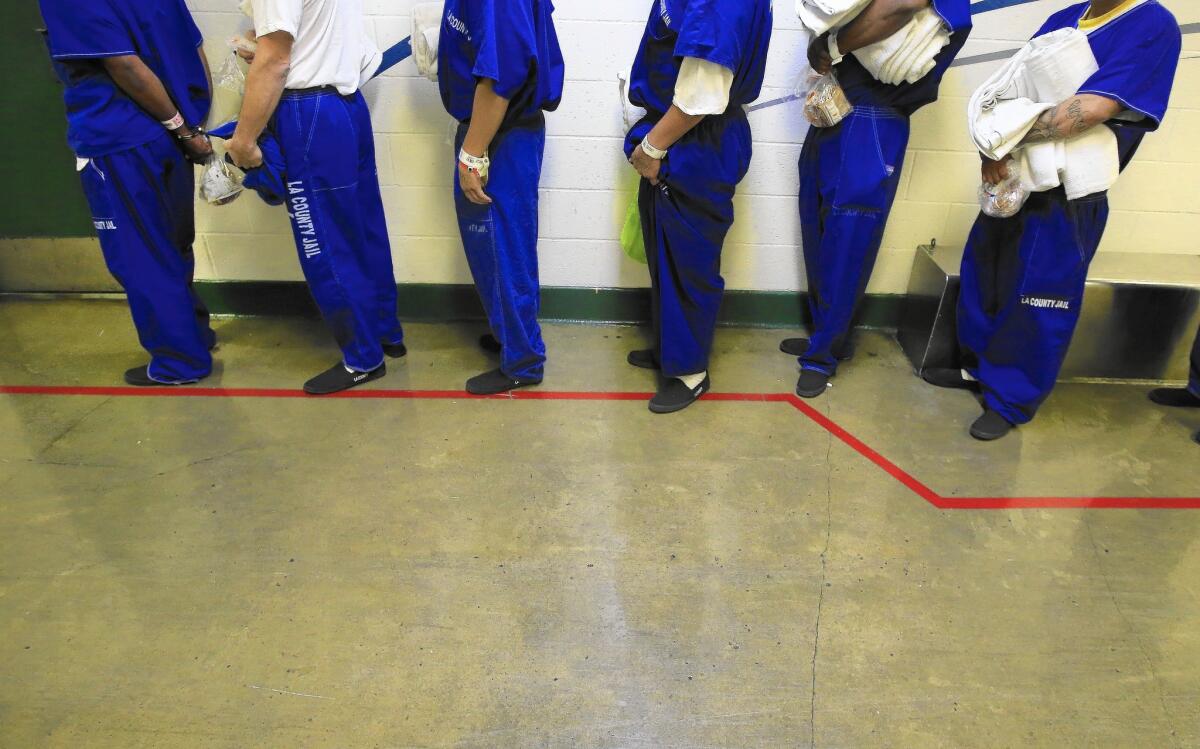Prop. 47 would cut penalties for 1 in 5 criminals in California

One in five California criminals could get a break under proposed new sentencing laws before voters this fall, but the measure is unlikely to produce big benefits for schools and communities, as its name suggests.
Proposition 47, billed as the “Safe Neighborhoods and Schools Act,” would reduce penalties for some of the most common crimes in California: drug possession, petty theft, possession of stolen goods, shoplifting, forgery and writing bad checks.
Those offenses, now potential felonies, would drop to misdemeanors. Punishment would fall from a possible three years to a maximum of one.
More than 58,000 of the 202,000 felony convictions in California in 2012, the latest figures available from the state, were for crimes listed in the ballot measure. Analysts say about 40,000 such cases would be reduced to misdemeanors; the initiative exempts offenses involving more than $950 and people with criminal records that include violence or sex offenses.
“We’re trying to address over-reliance on incarceration, over-reliance on prison,” said Lenore Anderson, who heads the Yes campaign as well as a nonprofit think tank, Californians for Safety and Justice, funded by many of the same sources.
Proponents also say the measure would save the state and counties hundreds of millions of dollars.
With $4.7 million from a handful of largely Democratic-affiliated foundations and wealthy individuals, and support from the state’s largest unions and community activist groups, the campaign has been running a social media effort for several months, with hashtags such as #SchoolsNotPrisons and #DoTheMath.
Supporters include George Soros’ Open Society Policy Center, Netflix co-founder Reed Hastings, rapper Jay Z and a few prominent conservative voices, such as that of Newt Gingrich.
“What we’re trying to do here is put together some sensible and modest sentencing reforms, and that would reduce the prison population,” Anderson said. “… Let’s not use prison beds for these petty crimes, for these low-level crimes.”
The majority of those who commit crimes covered by the initiative do not go to prison; they serve their time in jail or on probation. But the initiative could have some effect on California prison crowding and costs.
Proposition 47 would allow more than 7,000 inmates already serving time, including those convicted under the “three strikes” law, to petition courts to reduce their sentences. The nonpartisan Legislative Analyst’s Office estimates that annual savings to the state prison budget as a result of reduced sentences would eventually be $100 million to $300 million.
A quarter of the savings would be sent to the Department of Education, and 10% would go to a state victim compensation fund. The majority of the money would go to a state jail commission to disperse grants for mental health, substance abuse and diversion programs.
At the same time, however, costs would increase for state courts handling sentencing appeals. The legislative report does not say how much those costs would rise, but they could offset savings for the first few years, said analyst Drew Soderborg.
It is unlikely that costs for many counties would decrease either.
To reduce overcrowding in state lockups, California requires those convicted of low-level felonies to serve their sentences in county jails. But where jails are overcrowded, many inmates are released early, and a reduction in prisoners still leaves the jails at full capacity.
Los Angeles County, for example, releases more than 2,000 jail inmates early each month, after they have served as little as 15% of their sentences, because it cannot hold them all.
Proposition 47 resonates deeply with groups that say the poor are most often arrested on the relevant charges, and they hope it will galvanize voters.
“We see this as a social justice” cause, said Karen Lang, an organizer for the Community Coalition of Los Angeles. “We have been punishing crimes of poverty.”
But a long list of police chiefs, sheriffs, prosecutors and the statewide groups that represent them oppose the measure.
They have reported raising $288,000 for the No campaign, most of it earmarked to go to companies that send out campaign mail. They say the initiative would minimize some dangerous crimes, including gun theft.
Most firearms taken in burglaries are worth an average of $500, according to the federal Bureau of Justice Statistics — well under the $950 threshold.
San Diego Police Chief Shelley Zimmerman said 115 handguns were stolen from homes in her city in the first half of this year.
“They’re not stealing them to add them to their collection,” she said. “There is nothing safe about this.”
Anderson said that is a “misread” of the proposal. Even if the theft itself is reclassified as a misdemeanor, she said, prosecutors have at their disposal an array of other felonies to charge in gun-related crimes, including felony possession of a concealed gun, possession of a loaded stolen gun and possession of a stolen weapon by a gang member.
Soderborg told The Times last week that the initiative would, in fact, make the theft of guns worth $950 or less a misdemeanor. However, his office excluded that information from the official analysis that accompanies the ballot initiative and is published in the state voter guide.
Aaron Edwards, who wrote the analysis, explained that he believed the value of most guns exceeds $950 and “thus would not be affected by the measure.”
Los Angeles jail records show that more than 1,000 criminals in the last year served sentences for gun and auto theft, which are covered by the same penal code.
The ballot measure would apply the same misdemeanor charge no matter how many times an offender has committed one of the covered crimes. One Southern California prosecutor said that if previous crimes don’t count, getting caught becomes “just the cost of doing business.”
“Such career criminals,” said the prosecutor, who was not authorized to speak publicly, “are arguably more of a threat to the public than your one-time serious felon.”
paige.stjohn@latimes.com
Twitter: @paigeastjohn
More to Read
Start your day right
Sign up for Essential California for news, features and recommendations from the L.A. Times and beyond in your inbox six days a week.
You may occasionally receive promotional content from the Los Angeles Times.






